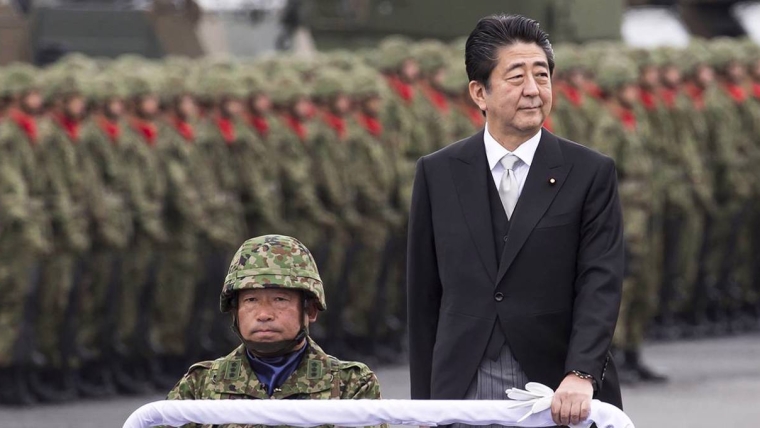
Former Japanese Prime Minister Abe Shinzō’s assassination at an election campaign event in Nara, Japan, is both shocking and puzzling. It is shocking because Japan has known almost no political violence for at least a half-century, and because gun ownership in the country is tightly controlled. It is puzzling because Abe, having stepped down as prime minister in 2020, had no formal government role; yet the killing was plainly a political act.
Abe’s death is unlikely to have any impact on the July 10 elections for Japan’s House of Councillors (the upper and therefore junior legislative chamber), which the ruling Liberal Democratic Party was already expected to win comfortably. The tragic loss of the LDP’s former leader and prime minister may add some sympathy votes by increasing turnout, but it has primarily astonished and bewildered a country that is completely unaccustomed to such violence.
Abe’s legacy from his record-setting tenure as prime minister – which was divided between an unsuccessful year in 2006-07, followed by a triumphal return for seven years from 2012 to 2020 – is more notable for its effects on Japanese foreign and security policy than on domestic affairs. To be sure, Abe was a good salesman for his economic-policy agenda, which he successfully promoted under the banner of “Abenomics”; but, in the end, it was his foreign policy, not his economic program, that was transformative.
Abe brought clarity, strength of purpose, and – by dint of his longevity in office – credibility to Japanese foreign policy. The fact that the term “Indo-Pacific” is now commonly used to describe security and diplomatic strategy in Asia is largely owing to Abe, who took a pre-existing Japanese effort to build a stronger relationship with India and used it to reframe and extend his country’s position both regionally and globally.
That stance was dictated by China’s rise and its increasingly assertive rhetoric and actions in and around the South and East China Seas. Under Abe, Japan committed itself to defining a strategic and diplomatic arena that would be harder for China to dominate. Deepening ties with India was part of that strategy, as were Abe’s efforts to strengthen Japan’s military. He was a leading proponent of proposals to amend the country’s constitution so that its military could play a bigger role alongside that of its key ally, the United States.
Abe was undeniably a nationalist. He originally courted controversy with somewhat revisionist views about Japan’s wartime history, especially regarding the hot-button issue of “comfort women” whom the Imperial Japanese Army forced into sexual slavery in occupied countries. Once in office, however, he largely played down his earlier views. Moreover, he built closer and deeper diplomatic relationships across Southeast Asia, improving ties even with the country’s prickliest neighbor and former colony, South Korea. While relations with China were often tense – especially when Abe visited Japan’s controversial Yasukuni Shrine for its war dead – Sino-Japanese dialogue was nevertheless maintained.
It is always difficult to guess the motives of a lone assassin. The man arrested for Abe’s murder, 41-year-old Tetsuya Yamagami, appears to have used a large, homemade shotgun. Given that Japan is one of the world’s safest countries, security at political events tends to be light, even for a former prime minister, which presumably explains how the gunman was able to pull it off.
According to news reports, Yamagami served for three years in Japan’s navy, the Maritime Self-Defense Force, until 2005. That background – combined with Abe’s advocacy of a stronger Japanese military and efforts to eliminate the constitution’s pacifist clause (Article 9) – makes it reasonable to speculate that the killing was committed in protest against the country’s military posture.
Although Abe was no longer in office, he was undoubtedly still the country’s most prominent and well-known advocate of a stronger military capability. In that capacity, he often expressed a determination to complete the work started by his grandfather, Nobosuke Kishi, who, as prime minister in 1960, shepherded through a revision to the country’s security treaty with the US, with a view to reinforcing Japanese defense.
Sadly, it is perhaps not coincidental that the last Japanese prime minister to fall victim to a violent attack was Kishi, who was stabbed by an assailant six times shortly after the revised security treaty was approved. Unlike Abe, however, his grandfather survived.
Bill Emmott, a former editor-in-chief of The Economist, is Co-Director of the Global Commission for Post-Pandemic Policy. Copyright: Project Syndicate, 2022, and published here with permission.
15 Comments
Somewhat grim irony that then Prime Minister Tsuyoshi was assassinated in 1932 by a group naval officers. Their motive though was more to precipitate war rather than prevent it. In the background, as an elder statesman, Abe had been steadily realigning Japan to more military strength. Hence reconfiguration of carriers to fighter jets instead of helicopters. Imagine too the roots of the recent formation the QUAD relationship were some of his architecture. Assassins, terrorists or the old fashioned anarchists always are going to threaten. The crazed and the lone wolf. Just as was revealed in Christchurch , here too now in well modulated Japan, no place no person is really safe these days. Perhaps that’s what it was, and hopefully the assassin had not been subverted and motivated by other international interests.
Abe had plenty of enemas , China & Sth Korea for starters ... he tried to greenwash Japan's WW2 crimes ... to rewrite history ... Japan has not apologized to those countries , so a tension exists to this day ...
Yes, he definitely needed enemas
I can't help thinking it is an internal assault. Even though there were adversatorys (sorry about the spelling but looking through the Collins dictionary I still could not find it, Still feel I should have stuck to my original spelling thought} Anyway I think he was right to strengthen his own country's defence as they have the technology and finance to do so . And maybe things have changed so much that having a strong Japan is good for our way of life.
"Beyond doubt it would speedily verify the proverb that a nation must ravage itself before foreigners can ravage it, a man must despise himself before others can despise him."
- Yukio Mishima
A great author.
Although I disliked one of his books recently translated into English.
Curious to see how the legacy of Abenomics is received over the years, given that the BoJ is now basically having to constantly ease to maintain some semblance of sanity in terms of export receipts - given Japan's domestic economy has been stagnant for some time and their demographic crisis is intensifying, foreigners buying Japanese-made has been their main outlet. But now they are out-manufactured by China and the Americans are going in big with R&D, so intellectual property is not the long-term earner it once was for Japan.
Structurally, the next steps for Japan are no clearer than they were when Abe took power, but I guess they're not really any worse either. One thing we can be sure of: under Abe, time went neither faster or slower. It just passed by.
Shot in the back, at close range.
Aye, so too was James Butler Hickok, Wild Bill, the world today seems too little different too often, to the Wild West.
... he was the first person to be murdered this year in Japan by a firearm !
Japan has just 0.3 guns per 100 people , the USA has 120/100 ... 400 000 registered guns in Japan , 400 million mostly unregistered guns in USA ...
... in calendar year 2021 , Japan had a death toll from gun violence of ... 1 .... the USA had 45 034
That’s the real sad truth of the matter. That USA figure doesn’t even begin to include the actual illegal ownership of firearms. You can buy a “hot” gun as easily as a phone, or watch. The reality is no amount of legislation over there, is ever going to reduce, not even in the slightest sense, the ready presence and danger. Too much of it for too long, deeply embedded in society.
... 300 mass shootings in the USA to date , half the year still to go ... their constitution needs an overhaul ... no one foresaw modern weaponry when they wrote up the right to bear arms ...
Beer ? ... hmmmm ... good idea , thanks Foxy !
Actually GBH, Guinness. Two of them. Braved the elements watching my local Colts extend their unbeaten record. Deserved them I said, when I got home.
Big Black G ... .. nice ... a favourite tipple from the cask ... shite from tins , but ... I've got some Mythica beers to chug , and some Test Lab tinnies ( Nelson ) ... cheers !
Yeah I think this Govt has done the right thing with the firearms thing. We had to hand in semi's but so what. Let's just give the Police the power to get in to the unlicenced gun owners Hard out.

We welcome your comments below. If you are not already registered, please register to comment
Remember we welcome robust, respectful and insightful debate. We don't welcome abusive or defamatory comments and will de-register those repeatedly making such comments. Our current comment policy is here.